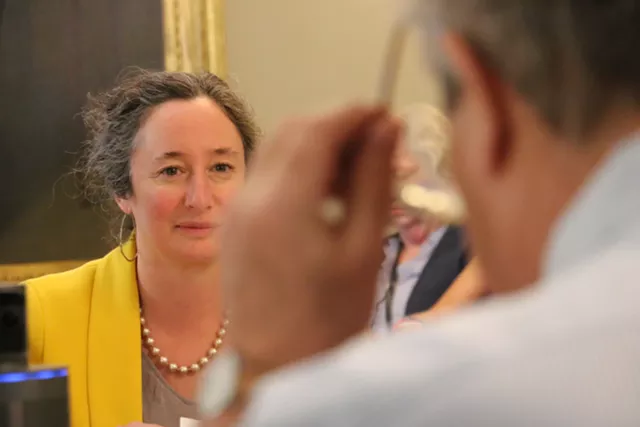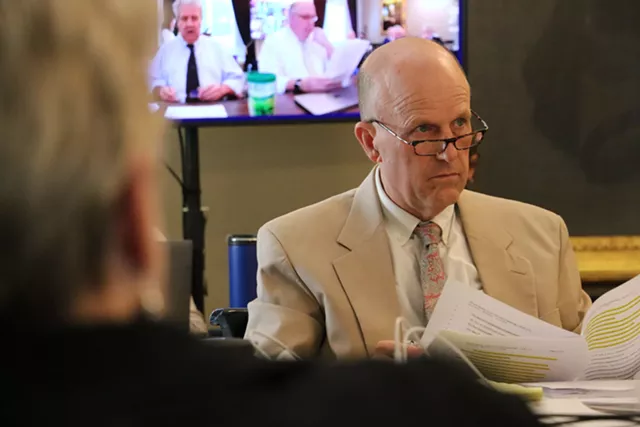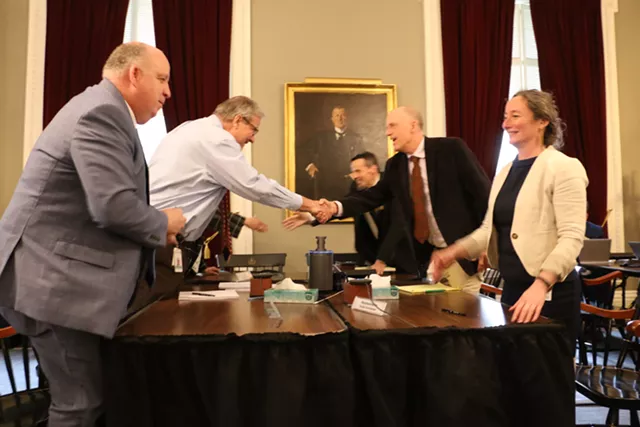The six lawmakers charged with hammering out differences between the House and Senate versions of the bill worked long hours over three days, mostly wrangling over the issue of how much taxpayer money should go to independent schools.
On Friday, they declared that they had put that and several others issues to bed and had reached a deal they could send to their colleagues when they reconvene on Monday.
Gov. Phil Scott, whose team had been working closely with lawmakers over the last several days, announced that H.454 was “not perfect,” but the changes made to it over recent days had earned his support.
“I believe it will put us on a path to stabilize property tax pressure for working Vermonters, while also putting us on a path to much needed governance reform that will unlock more opportunities for our kids,” Scott said at a press conference timed to coincide with the lawmakers’ agreement.
The governor said he was unsure whether a majority in the House and Senate would vote in favor of the compromise. But he said he hoped they would so the state can begin the process of transforming its education system in a way that saves taxpayers money and increases opportunities for kids.
Establishing a statewide per-student funding amount known as a foundation formula has the potential to save “hundreds of millions of dollars,” Scott said, compared to the ever-increasing school costs that have sent property taxes soaring in recent years.
“I don’t believe this will be a slam dunk by any stretch,” Scott said. “There will be Republicans who don’t vote for it. There will be Democrats who don’t vote for it.”
One key compromise was to speed up the reform efforts so they would take effect in 2028, a year faster than some lawmakers had initially hoped. Scott had argued for full implementation of the changes by 2027.
A great deal of work remains to be done to create new, larger school districts meant to save money by creating economies of scale. Critics, though, worry the changes will lead to the closure of smaller schools. Also outstanding is a way to properly fund career and technical schools.
Rural Families Feel Disempowered in the Face of Efforts to Reshape Their Schools

Rural Families Feel Disempowered in the Face of Efforts to Reshape Their Schools
By Alison Novak
Education
One issue negotiators agreed upon was minimum class sizes. While kindergarteners would be excluded from class size minimums, all other grades would have to abide by them. First grade classes would need to have at least 10 students. There would need to be at least 12 students for grades 2 through 5, 15 students for grades 6 through 8, and 18 students for grades 9 to 12.
Schools without sufficient students per grade would face pressure to consolidate.
The bill also proposes a number of changes to the state’s tax code, including a new classification that seeks to tax second homes and short-term rentals separately from commercial properties.
Some Senate Republicans are likely to have reservations about the bill’s top-down approach, said Sen. Scott Beck (R-Caledonia), the body’s minority leader. He said establishing a funding formula that pays every district the same amount per student is seen by some as stripping communities of local control.
“It feels like a real statewide solution, and they’re not generally receptive to statewide solutions,” Beck said of his caucus.
But Beck, a social studies teacher at St. Johnsbury Academy, said he planned to explain to his Republican colleagues just how many compromises had been made over the last several days, then let them make up their own minds.
Despite all the wrangling about money, the bill is really about ensuring “excellent educations opportunities for every Vermont child,” said Sen. Seth Bongartz (D-Bennington).
Yet it’s not clear whether Democrats will all be on board, either. Bongartz admitted that the bill was just the first step in a long process.
“We’ve got summers, falls, winters of work ahead of us to bring this all to true fruition,” he said. “There are about 1,000 moving pieces and this bill deals with about 100 of them.”
Bongartz is a former board chair of Burr and Burton Academy, one of the state’s independent schools. As lawmakers grappled with the Herculean task of reforming the state education system by consolidating districts, reforming tax rates, and devising a new funding formula, deep differences emerged between the House and Senate over how much to pay independent schools for the cost of educating about 4,000 Vermont students each year.
The state’s current tuitioning program, also known as school choice, allows students in towns without public high schools to attend public or independent schools in other communities, paid for by their hometown.
Members of the House argued that independent schools should receive the same amount per student as public schools would get under a new funding formula. Senators claimed those rates were so low that many independent school couldn’t survive.
Bongartz claimed that the House’s proposed rates represented an “existential threat” to independent schools by underfunding them. Such schools need to be able to charge a premium to cover the higher cost of educating high school students, he said, compared to elementary school students.
Senators originally suggested a 10 percent premium for independent high schools and an additional 10 percent for schools with career and technical education programs.
They eventually accepted a compromise: that independent high schools should be able to charge up to 5 percent more, under certain conditions.
The idea that independent schools might get more than public schools under the new system outraged some Democrats.
Sen. Ruth Hardy (D-Addison) said she was frustrated that the conference committee spent so much time on protecting independent schools when all schools are facing profound changes under the bill.
“It’s shocking to me that the Senate conferees are just obsessing over this very narrow part of the bill and this very narrow constituency,” Hardy told Seven Days.
Many independent schools benefit from large endowments and world-class facilities and are far more able to bridge funding gaps than public schools, Hardy said.
“Putting in these specific provisions that give them special dispensation and special compensation that all the other schools in the state don’t get is not equitable. It’s not fair,” Hardy said.



